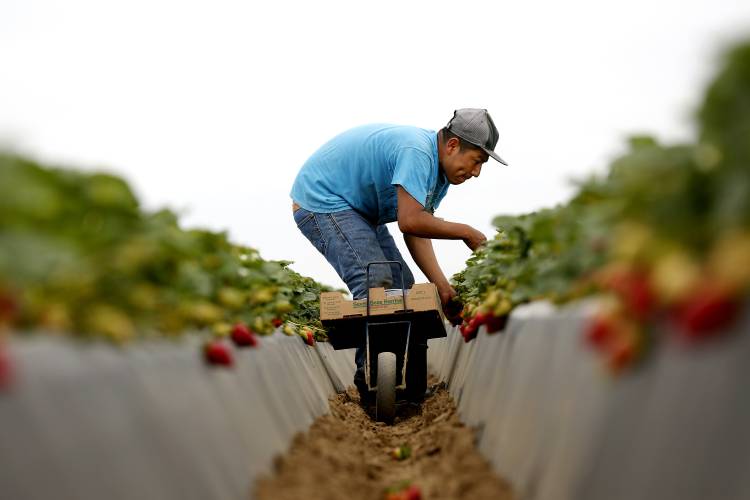Opinion: Make bread, not war: The survival of humanity depends upon it

A worker picks strawberries in California in 2017. Gary Coronado/ Los Angeles Times/ TNS
| Published: 03-11-2024 6:00 AM |
John Buttrick writes from his Vermont Folk Rocker in his Concord home, Minds Crossing. He can be reached at johndbuttrick@gmail.com
The Monitor has reported, “defense contractors are struggling to fill skilled positions that still exist in Maine and are key to the nation’s defense… The push comes as U.S. defense contractors work to replace munitions shipped to Ukraine … and for Israel’s war on Hamas.” This stress upon The United States workforce is the result of dependence on a war economy. The primary public message from U.S. leadership is that Ukraine and Israel have a “right to defend themselves,” which is a justification for their military strategy of violence with the complicity of the United States.
Yet, “war is trauma,” not justice, writes Eli McCarthy, in the National Catholic Reporter, “Many arguments for more weapons to both Israel and Ukraine are based on the distorted logic that the “right to defense” must primarily mean lethal, mass militarized defense.”
The theologian, Walter Wink, observed, the “myth of redemptive violence enshrines the belief that violence saves, that war brings peace, that might makes right.” Adhering to this “myth” results in a commitment to a war economy. In a war economy, the products made for war end in explosions, destruction, and death. Non-military products, however, live through their utility for society, live on through the production of more goods and products, and increase the livelihood for more skilled workers.
Also, military conflict breeds hunger. The World Food Program USA reports “nearly 60% of the world’s hungriest people live in conflict-affected areas.” The Biology, Health, and Medicine journal, BHM, reports that armed conflicts between warring nations result in both participants and supporters being exposed to “strongly adverse and often irreversible short- and long-term effects which may transmit across generations. Armed conflicts directly cause food insecurity and starvation by disruption and destruction of food systems, reduced farming populations, destroying infrastructure, disruptions in access to markets, or making goods and services unavailable altogether.”
However, The United States has the choice to be known as a nation committed to ending world hunger. The article “The Battle of the Breadbaskets” observes, “The United States has long been the breadbasket of the world, as large swathes of fertile farmland and cutting-edge agricultural innovations have enabled it to both feed its own people and populations across the globe … The United States should view agriculture as a key area of economic opportunity, especially as world food demand continues to increase.”
The California Department of Food and Agriculture notes that it’s a world supplier of food and agricultural commodities. Some of the leading agriculture commodities are dairy, grapes, almonds, walnuts, various varieties of fresh fruit, and vegetables. Over 400 different crops are grown in California. The Great Plains produce a large percentage of the world’s demand for grain and corn.
Our country has the opportunity to be known as a producer of food instead of a provider of weapons. A producer and purveyor of weapons is known as a warrior nation to be feared and even hated, resulting in divisions among the world’s nations.
Article continues after...
Yesterday's Most Read Articles
A provider of food gathers a reputation for generosity and is a nation that cares for the healthy nourishment of the world’s people. It means demonstrating security based upon building trust and cooperation. It means being perceived as a non-threatening nation worth befriending. Providing food is to become a nation committed to the humanitarian effort to feed the millions of malnourished and starving people.
This focus on food for the world means giving up arms manufacturing and dealing. It means greatly reducing U.S. military presence in many countries around the world. It means discontinuing military aid to Israel and instead helping Israel and Palestine to obtain security through building trust and friendship between them. It means the United States working with NATO to create ways to reduce the perception that it is a threat to Russia and other non-NATO nations. Ukraine is another of the world’s breadbaskets and therefore a resource, not a threat.
These things will not happen overnight, but Russian aggression may be less supported if its people perceive that Ukraine and NATO are not a threat. Non-adversarial relationships have to begin with someone. A first step may be for Russia, NATO, and Ukraine to join together to develop infrastructures for food distribution to the hungry of the world. Turn the focus away from military strength to strength of friendships.
It may sound impossible, but we have tried that myth of military strength for centuries. How has that worked out? The United States has the agricultural means to lead nations into a world of food justice and peace.







 Opinion: Concord should be run like a household, not a business
Opinion: Concord should be run like a household, not a business Opinion: Our leaders’ puzzling decision to eliminate the State Council on the Arts
Opinion: Our leaders’ puzzling decision to eliminate the State Council on the Arts Opinion: How dark can it get?
Opinion: How dark can it get? Opinion: Unfair taxes, unfair schools: The New Hampshire way
Opinion: Unfair taxes, unfair schools: The New Hampshire way
